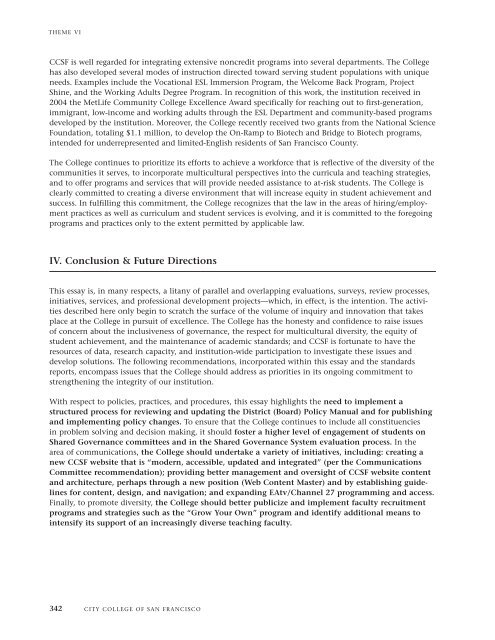City College of San Francisco - California Competes
City College of San Francisco - California Competes
City College of San Francisco - California Competes
Create successful ePaper yourself
Turn your PDF publications into a flip-book with our unique Google optimized e-Paper software.
THEME VI<br />
CCSF is well regarded for integrating extensive noncredit programs into several departments. The <strong>College</strong><br />
has also developed several modes <strong>of</strong> instruction directed toward serving student populations with unique<br />
needs. Examples include the Vocational ESL Immersion Program, the Welcome Back Program, Project<br />
Shine, and the Working Adults Degree Program. In recognition <strong>of</strong> this work, the institution received in<br />
2004 the MetLife Community <strong>College</strong> Excellence Award specifically for reaching out to first-generation,<br />
immigrant, low-income and working adults through the ESL Department and community-based programs<br />
developed by the institution. Moreover, the <strong>College</strong> recently received two grants from the National Science<br />
Foundation, totaling $1.1 million, to develop the On-Ramp to Biotech and Bridge to Biotech programs,<br />
intended for underrepresented and limited-English residents <strong>of</strong> <strong>San</strong> <strong>Francisco</strong> County.<br />
The <strong>College</strong> continues to prioritize its efforts to achieve a workforce that is reflective <strong>of</strong> the diversity <strong>of</strong> the<br />
communities it serves, to incorporate multicultural perspectives into the curricula and teaching strategies,<br />
and to <strong>of</strong>fer programs and services that will provide needed assistance to at-risk students. The <strong>College</strong> is<br />
clearly committed to creating a diverse environment that will increase equity in student achievement and<br />
success. In fulfilling this commitment, the <strong>College</strong> recognizes that the law in the areas <strong>of</strong> hiring/employment<br />
practices as well as curriculum and student services is evolving, and it is committed to the foregoing<br />
programs and practices only to the extent permitted by applicable law.<br />
IV. Conclusion & Future Directions<br />
This essay is, in many respects, a litany <strong>of</strong> parallel and overlapping evaluations, surveys, review processes,<br />
initiatives, services, and pr<strong>of</strong>essional development projects—which, in effect, is the intention. The activities<br />
described here only begin to scratch the surface <strong>of</strong> the volume <strong>of</strong> inquiry and innovation that takes<br />
place at the <strong>College</strong> in pursuit <strong>of</strong> excellence. The <strong>College</strong> has the honesty and confidence to raise issues<br />
<strong>of</strong> concern about the inclusiveness <strong>of</strong> governance, the respect for multicultural diversity, the equity <strong>of</strong><br />
student achievement, and the maintenance <strong>of</strong> academic standards; and CCSF is fortunate to have the<br />
resources <strong>of</strong> data, research capacity, and institution-wide participation to investigate these issues and<br />
develop solutions. The following recommendations, incorporated within this essay and the standards<br />
reports, encompass issues that the <strong>College</strong> should address as priorities in its ongoing commitment to<br />
strengthening the integrity <strong>of</strong> our institution.<br />
With respect to policies, practices, and procedures, this essay highlights the need to implement a<br />
structured process for reviewing and updating the District (Board) Policy Manual and for publishing<br />
and implementing policy changes. To ensure that the <strong>College</strong> continues to include all constituencies<br />
in problem solving and decision making, it should foster a higher level <strong>of</strong> engagement <strong>of</strong> students on<br />
Shared Governance committees and in the Shared Governance System evaluation process. In the<br />
area <strong>of</strong> communications, the <strong>College</strong> should undertake a variety <strong>of</strong> initiatives, including: creating a<br />
new CCSF website that is “modern, accessible, updated and integrated” (per the Communications<br />
Committee recommendation); providing better management and oversight <strong>of</strong> CCSF website content<br />
and architecture, perhaps through a new position (Web Content Master) and by establishing guidelines<br />
for content, design, and navigation; and expanding EAtv/Channel 27 programming and access.<br />
Finally, to promote diversity, the <strong>College</strong> should better publicize and implement faculty recruitment<br />
programs and strategies such as the “Grow Your Own” program and identify additional means to<br />
intensify its support <strong>of</strong> an increasingly diverse teaching faculty.<br />
342 CITY COLLEGE OF SAN FRANCISCO







